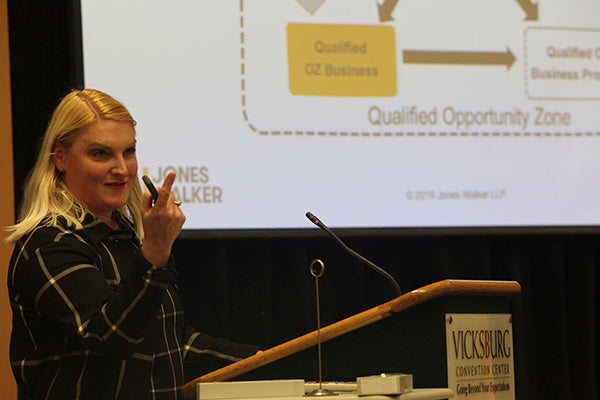Chamber luncheon attendees learn about Opportunity Zones
Published 7:43 pm Wednesday, March 20, 2019

- Aileen Thomas with Jones Walker speaks about the Opportunity Zone Program during the monthly Vicksburg Warren Chamber of Commerce Luncheon a the Vicksburg Convention Center Wednesday. (Courtland Wells/The Vicksburg Post)
Opportunity Zone investment and the process was the topic of Wednesday’s monthly chamber luncheon at the Vicksburg Convention Center.
Aileen Thomas, an expert on the program designed to encourage long-term private investment in low-income areas, informed those gathered about the incentives for utilizing Opportunity Zones, which is a provision in the Tax Cuts and Jobs Act of 2017.
Under the act, private investment within a designated Opportunity Zone may earn tax breaks on the capital gains generated through the investments. The tax benefits increase the longer investments are in place.
The program allows taxpayers to defer and potentially eliminate capital gain from the sale or exchange of property if the taxpayer reinvests the gain proceeds in a qualified Opportunity Zone.
Warren County has been approved for three opportunity zones:
• An area beginning in North Vicksburg at Haining Road north to the county line that includes the Kings community.
• Downtown Vicksburg from the intersection of Main Street and First East Street to Depot Street.
• East Clay Street and U.S. 80.
Vicksburg Forest Products was among the first in Mississippi to utilize the Opportunity Zone program when the Jackson-based company purchased the Anderson-Tully sawmill in May 2018, saving 125 jobs in the process.
Housing and Urban Development Secretary Dr. Ben Carson, who is chairman of the Opportunity and Revitalization Council organized by President Donald Trump, toured the sawmill in December.
At the time, Carson called the plant “ just an incredible sight here, because this is one of the first places to actually take advantage of the opportunity zones and opportunity funds. Had it not been for that program, it would very likely that this place would have closed down and those jobs gone away.”
Thomas said the Opportunity Zone is a marketing tool to attract long-term investment, but also outlined the process and benefits of investing in Opportunity Zones.
“The goal of the program is to create some type of new or tangible investment to revitalize low-income communities,” Thomas said.
Currently, Mississippi has 100 qualified Opportunity Zones.
For more information on Opportunity Zones, visit the Mississippi Development Authority website, mississippi.org.





